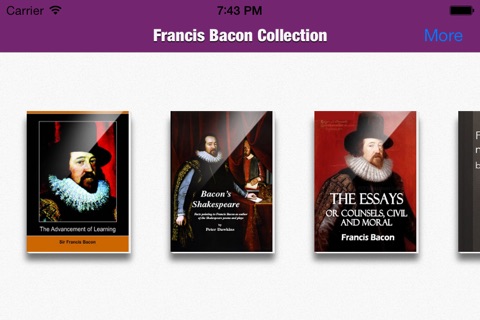
The Francis Bacon Collection app for iPhone and iPad
Sir Francis Bacon, 1st Viscount St. Alban, Kt., QC (22 January 1561 – 9 April 1626), was an English philosopher, statesman, scientist, jurist, orator, essayist, and author. He served both as Attorney General and Lord Chancellor of England. After his death, he remained extremely influential through his works, especially as philosophical advocate and practitioner of the scientific method during the scientific revolution.
Bacon has been called the creator of empiricism. His works established and popularised inductive methodologies for scientific inquiry, often called the Baconian method, or simply the scientific method. His demand for a planned procedure of investigating all things natural marked a new turn in the rhetorical and theoretical framework for science, much of which still surrounds conceptions of proper methodology today.
Bacon was knighted in 1603, and created Baron Verulam in 1618 and Viscount St. Alban in 1621; as he died without heirs, both peerages became extinct upon his death. He famously died by contracting pneumonia while studying the effects of freezing on the preservation of meat.
The Francis Bacon Collection includes:
1.The Advancement of Learning (English) (as Author)
2.Bacon is Shake-Speare
Together with a Reprint of Bacons Promus of Formularies and Elegancies (English) (as Contributor)
3.The Essays or Counsels, Civil and Moral (English) (as Author)
4.Filosofiset mietelmät (Finnish) (as Author)
5.Ideal Commonwealths (English) (as Contributor)
6.New Atlantis (English) (as Author)
7.Prefaces and Prologues to Famous Books
with Introductions, Notes and Illustrations (English) (as Contributor)
8.Valerius Terminus: Of the Interpretation of Nature (English) (as Author)


